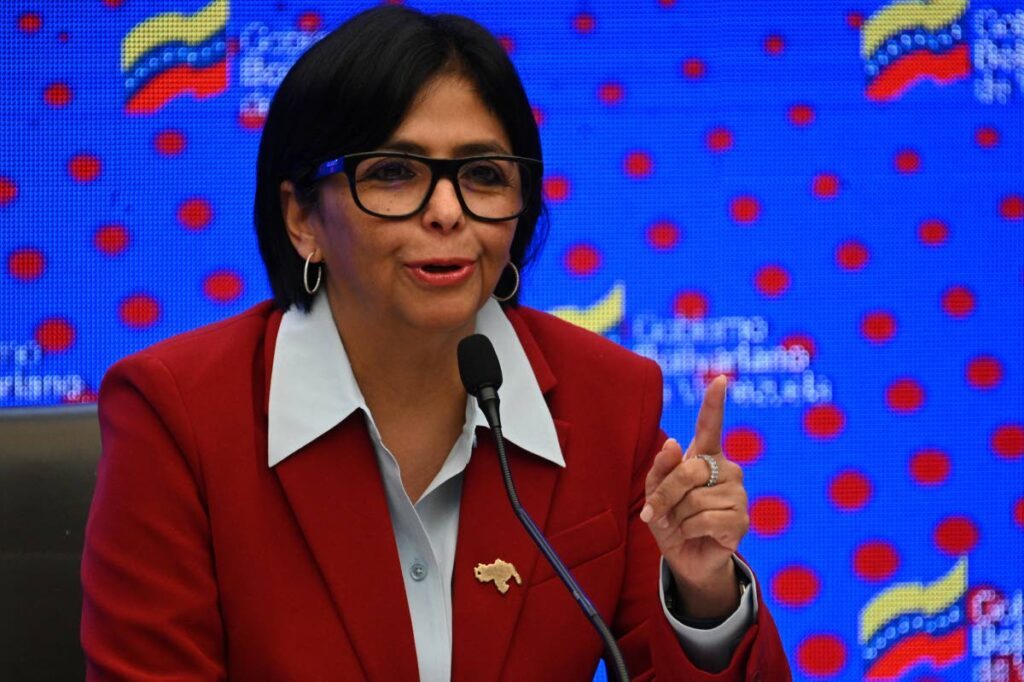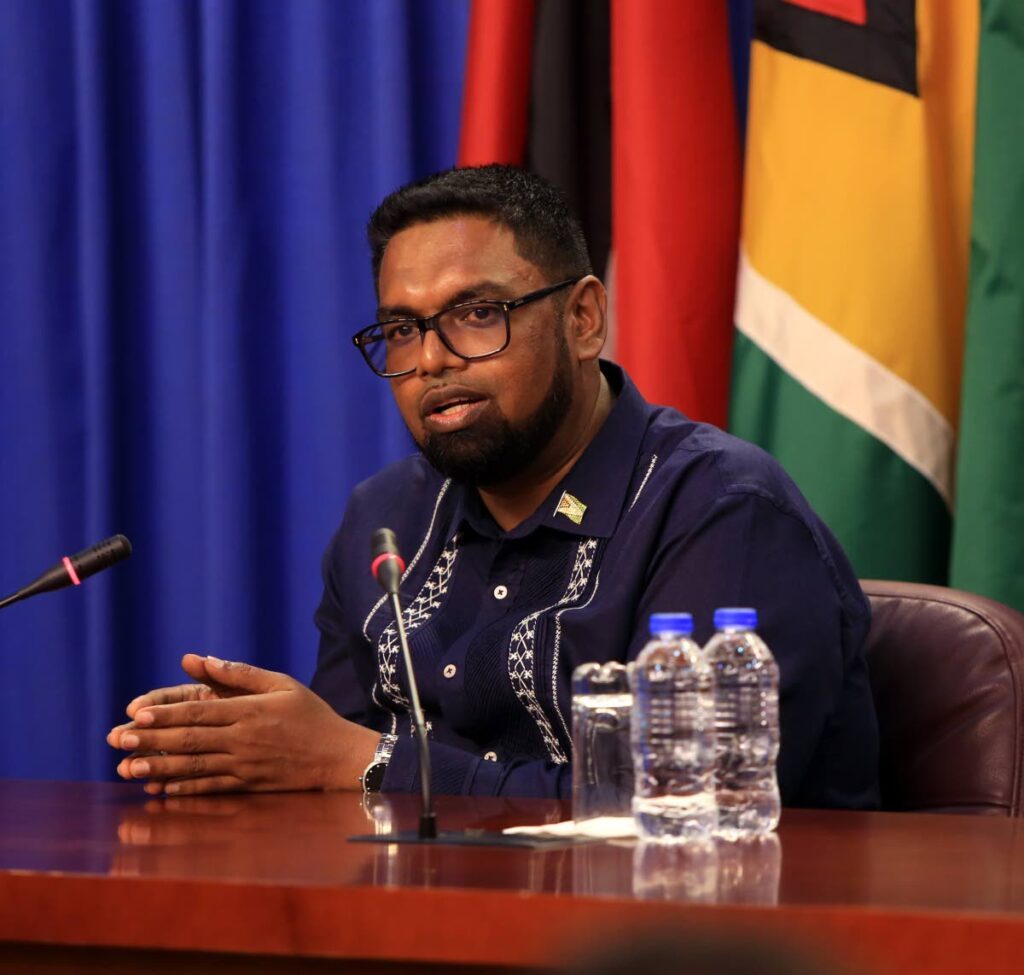Venezuela rejects calls to halt Essequibo referendum

VENEZUELA vice president Delcy Rodriguez on Wednesday rejected Guyana's calls to scrap the December 3 referendum on Venezuela's claim to the Essequibo region of Guyana, addressing the International Court of Justice (ICJ) at The Hague, Netherlands.
The ICJ, a UN body also known as the World Court, consisted of 16 judges chaired by US judge Joan Donoghue.
Rodriguez said, "I wish to begin by emphasising that our participation in this hearing in no way implies recognition of the jurisdiction of this honourable court over the territorial dispute concerning Guyana Esequiba or over the so-called provision measures requested by Guyana in flagrant violation of the UN Charter and the statute of this court."
Saying it was unacceptable to try to prevent the December 3 referendum, she said, "Venezuela shall not accept this."
On her jacket, Rodriguez sported a Venezuelan flag – upgraded by former president Hugo Chavez in 2006 with an extra star to represent "the Guayana Province" – plus a broach in the shape of an enlargened Venezuela incorporating the Essequibo.
"Following the attempt to dispossess our nation of its territory by the fraud perpetrated by the Paris Tribunal in 1899, Venezuela adopted on the basis of its historical position, a doctrine of not submitting the settlement of disputes relating to its vital interests – including independence and territorial integrity – to the decision of third parties."
She said Venezuela had consistently rejected the court's automatic jurisdiction on 12 ocassions in this dispute, arguing the 1966 Geneva Agreement did not view the judicial route as an amicable means of resolution.
Rodriguez said Venezuela – plus Guyana and the US – were among 119 countries not accepting article 36(2) of the court's statute, whereby nations may accept the ICJ's authority in "all legal disputes" of four types – treaty, international law, international obligation, and reparation for breach of the latter.
She hit Guyana's presentation on Tuesday as "crude and childish manipulation" aimed at stigmatising Venezuela's legal and historical position.
"We are here because Guyana has not only decided to abandon and transgress the Geneva Agreement but now intends to flout the international order and promote a change in the Venezuelan political system through an interventionist and audacious action that seeks to instrumentalise the court against Venezuela."
She accused Guyana of "judicial colonialism," but said Venezuela rejected any attempt to interfere in its internal affairs.
"Nothing will prevent the referendum scheduled for December 3 from being held."
She said Guyana's request to halt the referendum was "unprecedented and unusual" and created dangers within the international community.
Rodriguez alleged Guyana in 2018 brought "a fraudulent claim" to the court to strip Venezuela of 15 per cent of its territory. She said Guyana now wanted the ICJ to intefere with Venezuelans exercising "sacred right" to vote in the referendum on a vital issue, but would not succeed.
Saying the referendum allowed the Venezuelan people's "sovereignty and self determination," she said Guyana must not interfere in Venezuela's internal affairs.

The UN Charter (article 2), she said, banned any state from interference in another country's internal affairs.
The use of referenda was protected by the Venezuelan Constitution and the International Covenant on Civil and Political Rights, she said.
Rodriguez said her government would not turn its back on whatever the Venezuela people voted for in the referendum.
She said Guyana had sought to portray itself as a defenceless sheep, with Venezuela as an aggressor, but said, on the contrary, Guyana was among the Caribbean nations benefiting from Venezuelan oil on favourable terms including payment by rice.
Rodriguez claimed ExxonMobil's oil extraction had not raised Guyanese living standards, which had previously been lifted by Venezuela's Petrocaribe programme.
She said Guyana had approved calls made at the Organisation of American States (OAS) for military action against Venezuela, had joined the Lima Group, and liaised with the US Southern Command. Rodriguez showed a video-clip of Guyana president Dr Mohamed Irfaan Ali declaring Guyana would not give up an inch of the Essequibo, which she claimed showed him in military attire in the Essequibo.
"Yesterday we were astounded to hear Guyana's lies when they accused Venezuela of threatening peace and stability in the region." Rodriguez alleged that for decades Guyana has portrayed itself as a victim, including an allegedly faked photo a warship off Georgetown claimed in 2015 by then president David Granger.
"Guyana has prepared for a military attack against Venezuela with the support of its strategic and geopolitical ally, the United States."
Saying Ali and US secretary of state Mike Pompeo had in 2020 signed an agreement which she claimed threatens Venezuela's security, she lamented that US troops often visit Guyana.
Rodriguez said in 2017 former US president Donald Trump named ExxonMobil former CEO Rex Tilerson as US secretary of state, with Guyana relinquishing the Geneva Agreement and the US for the first time supporting Guyana's position in the territorial dispute.
She said Guyana had granted oil and gas concessions in a maritime territory that had yet to be delimited, despite a 2011 joint declaration by both countries that the delimitation remained outstanding and required negotiation.
"All of this apparent and illegal behaviour has shown the true face of Guyana – an aggressor state, a predator of natural resources and a violator of international law – in no way a victim."
She said the referendum was an expression of Venezuelan democracy and must not be curbed by Guyana.
"On December 3, 2023, the people of Venezuela, in keeping with its democratic tradition, will go to the ballot box to show the world that our rights on Guyana Esequiba are inalienable and indisputable."
She said Venezuela had lost territory as a victim of British colonialism.
Rodriguez said, "Venezuela has never attacked any country, or crossed borders to invade or annex territories."
She hailed Venezuela president Nicholas Maduro as a "a trued democrat, who consults and listens to the people," and a man of peace keen on settlement by negotiation.
After Rodriguez, came presentations in support of Venezuela by Prof Makane Moise Mbengue of the University of Geneva plus agent to the ICJ, Samuel Moncada.

Comments
"Venezuela rejects calls to halt Essequibo referendum"